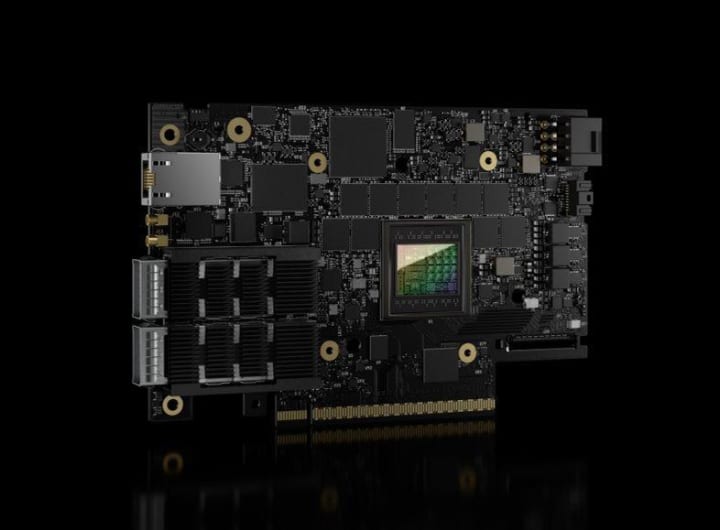Canonical collaborates with NVIDIA to simplify enterprise AI deployments with NVIDIA BlueField-3 operating an optimised, Ubuntu-based Linux OS
Shashank Balashankar
on 19 March 2024
The NVIDIA BlueField-3 networking platform – powering the latest data processing units (DPUs) and SuperNICs, and transforming data centre performance and efficiency – runs BlueField OS, an optimised Linux operating system (OS) derived from Ubuntu. With Ubuntu’s signature maintenance and support guarantees, the comprehensive Ubuntu Pro software infrastructure stack, and bespoke optimisation, the collaboration between NVIDIA and Canonical accelerates time to value for NVIDIA BlueField-3 users and elevates security.
What are DPUs?
DPUs are a relatively new technology that represents the third pillar of accelerated data centre processing units, alongside CPUs and GPUs. By offloading and accelerating a wide variety of complex networking, security and storage workloads to the DPU, enterprises can reduce server power consumption by up to 30% while freeing up CPU capacity for computation tasks.

NVIDIA, now shipping the third generation of its industry-leading BlueField DPU, empowers enterprises to transform data centres with a 400Gb/s infrastructure compute platform that can handle the most demanding AI workloads.
NVIDIA BlueField OS is built on Ubuntu
DPUs require an operating system that is secure, stable and capable of supporting all of the innovative features that the new technology brings to the table – and that’s why NVIDIA BlueField-3 runs an optimised derivative of Ubuntu as its default OS.
Ubuntu, delivered by Canonical, supports a broad range of NVIDIA BlueField-3 features, ensuring that enterprise customers can readily consume the DPU functions with optimal performance. Canonical’s collaboration with NVIDIA delivers a solution that is easy to implement and offers full functionality out of the box.
Alongside time to value, Ubuntu reinforces the stability of NVIDIA BlueField-3. The optimised Ubuntu derivative powering the NVIDIA BlueField OS is based on Ubuntu Long Term Support (LTS) and goes through the same rigour of validation as an LTS release, which consequently delivers the same level of stability and performance. Ubuntu Pro embedded support is a core part of NVIDIA BlueField’s OS, thus enhancing the reliability of any NVIDIA BlueField-accelerated solution.
NVIDIA BlueField-3 Enterprise support and security backed by Canonical
Ubuntu’s extensive security features, hardening and compliance tooling, coupled with Canonical’s enterprise-grade support, have been instrumental in making Ubuntu the first-choice OS for organisations worldwide. NVIDIA customers can be assured that these same capabilities are also extended to NVIDIA BlueField-3 deployments.
One of the key factors that sets Ubuntu’s security apart from alternative operating systems is the pace at which Canonical delivers fixes for security common vulnerabilities and exposures (CVEs). Canonical has the fastest turnaround for CVE fixes in the industry, and this rapid patching applies to the NVIDIA BlueField OS. What’s more, these updates can be applied automatically, further minimising any windows of vulnerability.
Canonical is also signing the entire kernel image for the NVIDIA BlueField OS. This enables secure boot in enterprise deployments and guarantees that no modifications are made to the kernel, so that users can have complete trust in the OS.
Powering AI with Canonical infrastructure solutions and NVIDIA BlueField-3
NVIDIA BlueField-3 DPUs are increasingly becoming a central component in enterprise AI strategies. These use cases require a comprehensive ecosystem of software for optimal performance and efficiency. Canonical’s close collaboration with NVIDIA enables BlueField-3 users to take advantage of infrastructure solutions to address most enterprise AI data centre deployments and enable end-to-end management.
Customers can utilise metal-as-a-service (MAAS) for cloud-style provisioning of their physical infrastructure, turning bare-metal servers into an elastic, cloud-like resource that they can easily provision, monitor and manage. Meanwhile, Juju provides an orchestration engine for software operators that enables the deployment, integration, and lifecycle management of applications at any scale on infrastructure compute.
On the infrastructure software side, Canonical OpenStack provides an enterprise cloud platform, and Canonical Kubernetes drives seamless, highly automated container orchestration. These infrastructure services can fully utilise the offload capabilities supported in NVIDIA BlueField DPUs. In fact, Canonical also offers MicroK8s, a lightweight Kubernetes distribution that is tailor-made for low footprint deployments on DPUs. Similarly, MicroCloud is a miniature version of LXD, providing enterprises with everything they need to run virtualized workloads and system containers on their DPUs. All of these solutions are secured and supported for 10 years with an Ubuntu Pro subscription.
Ubuntu Pro and NVIDIA DOCA
The Ubuntu Pro stack works in tandem with NVIDIA DOCA, software at the heart of NVIDIA BlueField-3. NVIDIA DOCA is a unified software framework that provides a variety of APIs for improved NVIDIA BlueField-3 management, unlocking features around connectivity, monitoring, logging and more. Utilised alongside Ubuntu Pro, these features drive unprecedented infrastructure efficiency.
- To learn more about deploying DPUs on Ubuntu, get in touch.
- To learn more about NVIDIA BlueField-3, check out the datasheet.
- Further reading: Canonical solutions reduce SmartNIC time-to-market and drive efficiency in enterprise data centers
Talk to us today
Interested in running Ubuntu in your organisation?
